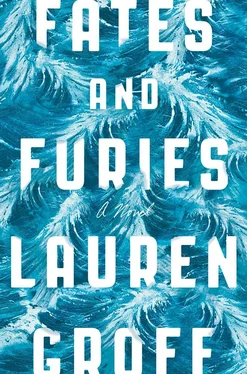Antoinette had been raised in a saltbox on the New Hampshire coast: five younger sisters, a draft so dreadful in the winter that she thought she’d die before she got her clothes on in the morning. Drawers of saved buttons and dead batteries. Baked potatoes six meals in a row. She’d had a full ride to Smith but couldn’t get off the train. A magazine on the seat beside hers had opened to Florida, trees dripping golden fruit, sun, luxe. Heat. Women in fishtails undulating in mottled green. It was ordained. She went to the end of the line, the end of her cash, hitched to Weeki Wachee. When she entered the manager’s office, he took in her waist-length red-gold hair, her switchback curves, murmured, Yes .
The paradox of being a mermaid: the lazier she looks, the harder the mermaid works. Antoinette smiled languorously and dazzled. Manatees brushed her; bluegills nibbled at her hair. But the water was a chilly seventy-four degrees, the current strong, the calibration of air in the lungs exact to regulate buoyancy or sinking. The tunnel the mermaids swam down to reach the theater was black and long and sometimes caught their hair and held them there by the scalp. She couldn’t see the audience but felt the weight of their eyes through the glass. She turned on the heat for the invisible watchers; she made them believe. But sometimes, as she grinned, she thought of sirens as she knew them: not this sappy Little Mermaid she was pretending to be, but the one who gave up her tongue and song and tail and home to be immortal. The one who’d sing a ship full of men onto the rocks and watch, ferocious, while they fell lax into the deep.
Of course, she went to the bungalows when summoned. She met television actors and comics and baseball players and even that swivel-hipped singer once, during the years he’d made himself over into a film star. They made promises, but not one made good. No jets would be sent for her. No tête-à-têtes with directors. She would not be installed in a house in Beverly Hills. She passed into her thirties. Thirty-two. Thirty-five. She could not be a starlet, she understood, blowing out the candles. All she had ahead of her was the cold water, the slow ballet.
Then Sallie walked into the theater set under the water. She was seventeen, sun-scorched. She’d run away; she wanted life! Something more than her silent brother who spent eighteen hours a day at his bottling plant and came home to sleep. But the mermaids’ manager just laughed at her. So skinny, she was more eel than nixie. She crossed her arms and sat down on his floor. He offered her the hot dog concession to get her up. And then she came into the darkened amphitheater and stood dumbstruck at the glinting glass, where Antoinette was in mid-performance in a red bikini top and tail. She took up all the light.
Sallie’s fervent attention dilated down to the size of the woman in the window and there it would stay, fixed, for good.
She made herself indispensable. She sewed sequined posing tails, learned to use a respirator to scrape algae from the spring side of the glass. One day a year later, when Antoinette was sitting slumped in the tube room, rolling the sodden tail off her legs, Sallie edged near. She handed Antoinette a flyer for Disney’s new park in Orlando. “You’re Cinderella,” she whispered.
Antoinette had never felt so understood in her life. “I am,” she said.
She was. She was fitted into the satin dress with hoops beneath, the zirconium tiara. She had an apartment in an orange grove, a new roommate, Sallie. Antoinette was lying in the sun on the balcony in a black bikini and slash of red lipstick when Gawain came up the stairs carrying the family rocking chair.
He filled the doorway: six-foot-eight, so hairy his beard extended into his haircut, so lonely that women could taste it in his wake when he passed. He’d been thought slow, yet when his parents died in a car crash when he was twenty, leaving him with a seven-year-old sister, he was the only one to understand the value of the family’s land. He used their savings as down payment to build a plant to bottle the clean, cold water from the family’s source. Selling Florida’s birthright back to its owners was borderline immoral, perhaps, but the American way to make money. He accumulated wealth, spent none. When his hunger for a wife got too intense, he’d built the plantation house with vast white Corinthian columns all around. Wives loved big columns, he’d heard. He waited. No wives came.
Then his sister called to demand he bring family bits and bobs up to her new apartment, and here he was, forgetting how to breathe when he saw Antoinette, curvy and pale. She could be forgiven for not understanding what she was seeing. Poor Gawain, his mat of hair, his filthy work clothes. She smiled and lay back to be adored again by the sun.
Sallie looked at her friend, her brother; felt the pieces snap together. She said, “Gawain, this is Antoinette. Antoinette, this is my brother. He’s got a few million in the bank.” Antoinette rose to her feet, floated across the room, set her sunglasses atop her head. Gawain was close enough to see her pupil swallow her iris, then himself reflected in the black.
The wedding was hasty. Antoinette’s mermaids sat glinting in tails on the steps of the church, throwing handfuls of fish food at the newlyweds. Sour Yankees bore the heat. Sallie had sculpted a cake topper in marzipan of her brother lifting a supine Antoinette on one arm, the adagio, grand finale of the mermaid shows. Within a week, furniture for the house was ordered, help arranged for, bulldozers gouging out dirt for the pool. Her comfort secured, Antoinette had no more imagination for how she’d spend the money; everything else was catalog quality, good enough for her.
Antoinette took the comfort as her due; she hadn’t expected the love. Gawain surprised her with his clarity and gentleness. She took him in hand. When she shaved away all that hair, she found a sensitive face, a kind mouth. With the horn-rimmed glasses she’d bought him, in bespoke suits, he was distinguished if not handsome. He smiled at her across the room, transformed. At that moment, the flicker in her leapt into flame.
Ten months later came the hurricane, the baby.
—
IT WAS TAKEN FOR GRANTED by this trio of adults that Lotto was special. Golden.
Gawain poured into him all the love he’d swallowed back for so long. Baby as a lump of flesh molded out of hope. Called dumb his whole life, Gawain held his son and felt the weight of genius in his arms.
Sallie, for her part, steadied the household. She hired the nannies and fired them for not being her. She chewed up banana and avocado when the baby began to eat food, and put them into his mouth as if he were a chick.
And as soon as Antoinette received the reciprocal smile, she turned her energies to Lotto. She played Beethoven on the hi-fi as loudly as it would go, shouting out musical terms she’d read about. She took correspondence courses on Early American furniture, Greek myth, linguistics, and read him her papers in their entirety. Perhaps this pea-smeared child in his high chair got only a twelfth of her ideas, she thought, but no one knew how much stuck in child brains. If he was going to be a great man, which he was, she was certain, she would start his greatness now.
Lotto’s formidable memory revealed itself when he was two years old, and Antoinette was gratified. [Dark gift; it would make him easy in all things, but lazy.] One night Sallie read him a children’s poem before bed, and in the morning, he came down to the breakfast room and stood on a chair and bellowed it out. Gawain applauded in astonishment, and Sallie wiped her eyes on a curtain. “Bravo,” Antoinette said coolly, and held up her cup for more coffee, masking the tremble in her hand. Sallie read longer poems at night; the boy nailed them by morning. A certainty grew in him with each success, a sense of an invisible staircase being scaled. When watermen came to the plantation with their wives for long weekends, Lotto snuck downstairs, crawled in the dark under the guest dinner table. In the cavern there, he saw feet bulging out of the tops of the men’s moccasins, the damp pastel seashells of the women’s panties. He came up shouting Kipling’s “If—” to a roaring ovation. The pleasure of these strangers’ applause was punctured by Antoinette’s thin smile, her soft “Go to bed, Lancelot,” in lieu of praise. He stopped trying hard when she praised him, she had noticed. Puritans understand the value of delayed gratification.
Читать дальше












